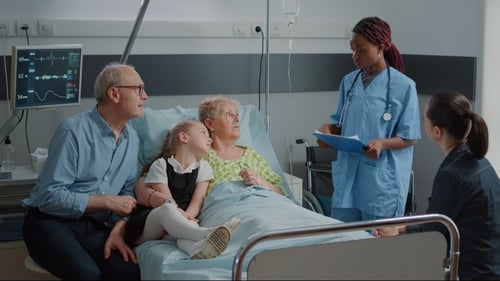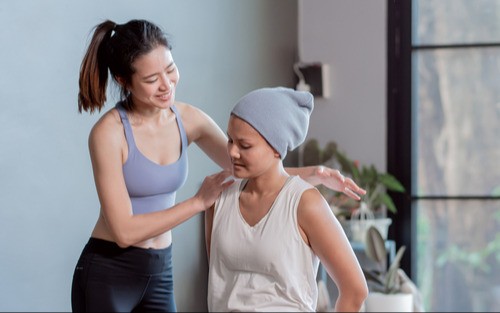Palliative and Integrative Care
and Integrative Medicine
is an area of medicine focused on quality of life issues for patients and their families facing life-threatening illness. Integrative medicine is a combination of traditional medicine and complementary medicine to treat the whole person; mind, body and spirit.
specialists address a broad range of issues, including:
- support for family members and caregivers
- pain and symptom management
- nutritional support
- emotional distress
- financial issues
- end of life issues
Although may address end of life issues for patients with serious illness, it is different from hospice care. is available at any of a serious illness, including during active treatment. Hospice refers to a special type of to maintaining comfort in people towards the end of their lives. People with serious illness are often referred to hospice care if they have decided to discontinue active treatment, and they are expected to six months or less.
The National Comprehensive Cancer Network (NCCN) has guidelines for , which includes:
- All cancer patients should be screened for needs at their initial visit, at appropriate intervals, and as clinically indicated.
- Patients/families/caregivers should be informed that is an integral part of their comprehensive cancer care.
- specialists should be readily available to provide consultation or direct care to patients/families/caregivers and/or health care professionals who request or require their expertise.
The American Society of Clinical Oncologists (ASCO) recommends that all patients with advanced cancer receive a plan within eight weeks of their diagnosis. Other recommendations include:
- Patients with advanced cancer should receive dedicated services early in the disease course and while undergoing treatment.
- Providers may refer caregivers of patients with early or advanced cancer to services.
Integrative medicine
Integrative medicine is a combination of traditional medicine and complementary medicine to treat the whole person; mind, body and spirit. The National Center for Complementary and Integrative Health (NCCIH) is a branch of the National Institutes of Health. They advise that people learn about the benefits, risks and scientific evidence before pursuing any complementary or integrative product or practice. This is particularly important for people who are thinking about taking supplements that have not been prescribed by their doctor.
The NCCN has guidelines on the use of dietary supplements:
- Taking dietary supplements is not recommended for most cancer survivors unless a patient has a known nutritional deficit, an inadequate diet or other indication (for example, ).
- Little data exist to support the use of vitamins or other dietary supplements for the purposes of cancer control, recurrence or prevention.
- Taking vitamin supplements does not replace the need for a healthy diet. Patients should try to get nutrients from the foods they eat and the beverages they drink.
- People should tell their doctors about any supplements that they are taking.
The Society for Integrative Oncology (SIO) guidelines recommend the following evidence-based guidelines for integrative therapies:
- Music therapy, meditation, stress management, and yoga for anxiety/stress reduction.
- Meditation, relaxation, yoga, massage and music therapy for depression/mood disorders.
- Meditation and yoga to improve overall quality of life.
- Acupressure and acupuncture for reducing chemotherapy-induced nausea and vomiting.
In the News
View our Webinar
How palliative care can help people at any stage of diagnosis
The following resources can help you locate an expert near you.
Finding and hospice services
- The Center to Advance (CAPC) maintains a directory of programs by location.
Related experts
People experiencing side effects from cancer or treatment may benefit from a consultation with the following experts.
Acupuncture experts
- The National Certification Commission for Acupuncture and Oriental Medicine has a searchable directory of licensed acupuncturists.
Mental health experts
- Association of Oncology Social Workers: Database for finding a social worker by location.
- National Alliance on Mental Illness: Tips for finding a mental health professional.
- The Anxiety and Depression Association of America: Database of licensed professionals who provide telehealth services.
- Mental Health America: Tool for finding a mental healthcare professional based on people's current needs.
Nutritionists
- Eatright.org, the website for the Academy of Nutrition and Dietetics, has an online tool to find a nutritionist in your area. Search by specialty, including "cancer," "weight management" and "heart health."
Physical therapists
- The American Physical Therapy Association's ChoosePT.com website helps you to search for a physical therapist in your area.
Sexual health experts
- The Sexual Medicine Society of North America (SMSNA) has a search tool to find experts in your area who provide sexual healthcare services.
- The American Association of Sexuality Educators, Counselors and Therapists (AASECT) maintains a tool to help people find a nearby sexual health expert.
Sleep experts
- The American Academy of Sleep Medicine maintains the SleepEducation.org website, which includes a section on finding a sleep center by location.
Other ways to find experts
- Register for the FORCE Message Boards and post on the Find a Specialist board to connect with others who share your situation.
- National Cancer Institute (NCI)-Designated Comprehensive Cancer Centers have specialists to manage the symptoms and side effects of cancer prevention or treatment.
The following studies are looking at for people diagnosed with cancer:
- Coaching for Family Caregivers of People with Advanced Cancer from Rural and Minority Communities. This study provides coaching to urban African Americans and white or African American families with cancer who live in the rural Southeast. Navigators working with a team provide six health coaching sessions either in person or over the phone to help with managing stress and coping, getting and asking for help, improving caregiving skills and decision-making/advance care planning.
- NCT04733469: EMPOWER 3: Improving Health Literacy and Utilization (EMPOWER 3). This study is designed to test an educational intervention to help patients understand , use it and feel better emotionally and physically.
- NCT04773639: of a Multi-Modal Intervention. This study evaluates a new approach to to address advanced care planning and psychosocial needs of patients with cancer.
- NCT06307535: Study of Meaning-Centered Psychotherapy for Caregivers to People With Cancer. Participants will complete questionnaires and will be assigned to receive psychotherapy for 7 sessions.
- NCT05477784: Cancer Parenting Program for the Enhancement of the Quality of Life of Patients With Advanced Cancer and Their Children (EC-PC). This trial examines the usefulness of two educational programs for parents with cancer who have a 5- to 17-year-old child.
The following studies look at integrative medical care for people diagnosed with cancer:
Multiple cancer types
- NCT04917796: The Effect of Electroacupuncture on Nerve Pain Caused by Chemotherapy (Chemotherapy-Induced Peripheral Neuropathy. This study investigates whether electroacupuncture can improve peripheral neuropathy pain caused by chemotherapy in cancer survivors.
Breast cancer
- NCT04837820: Effect of Acupuncture on Memory and Thinking Difficulties after Breast Cancer. This study tests whether acupuncture can improve difficulties and insomnia for survivors of breast cancer.
Gynecologic cancer
- NCT05053230: A Study Evaluating the Integrative Medicine at Home (IM@HOME) Program in People With Gynecologic Cancer. This study looks at whether the Integrative Medicine at Home program can reduce patients' symptoms (such as tiredness, pain or insomnia). This program offers virtual (online rather than in-person) group classes focusing on mind-body practice.
Prostate cancer
- NCT04519879: White Button Mushroom Sup for the Reduction of in Pts With Biochemically Rec or Therapy Naive Fav Risk Cancer. This phase II trial studies how well white button mushroom supplement reduces prostate-specific antigen () levels in patients with cancer that has come back (recurrent) or has favorable risk and has not undergone any therapy (therapy-naive).
The following resources can help you locate an expert near you.
Finding integrative care experts
- The Institute for Functional Medicine has a Find an Expert tool that allows you to locate healthcare experts across many specialty services.
- The National Certification Commission for Acupuncture and Oriental Medicine has a searchable directory of licensed acupuncturists.
Other ways to find experts
- Register for the FORCE Message Boards and post on the Find a Specialist board to connect with others who share your situation.
- The National Cancer Institute (NCI)-Designated Comprehensive Cancer Centers have specialists who manage the symptoms and side effects of cancer prevention or treatment.



